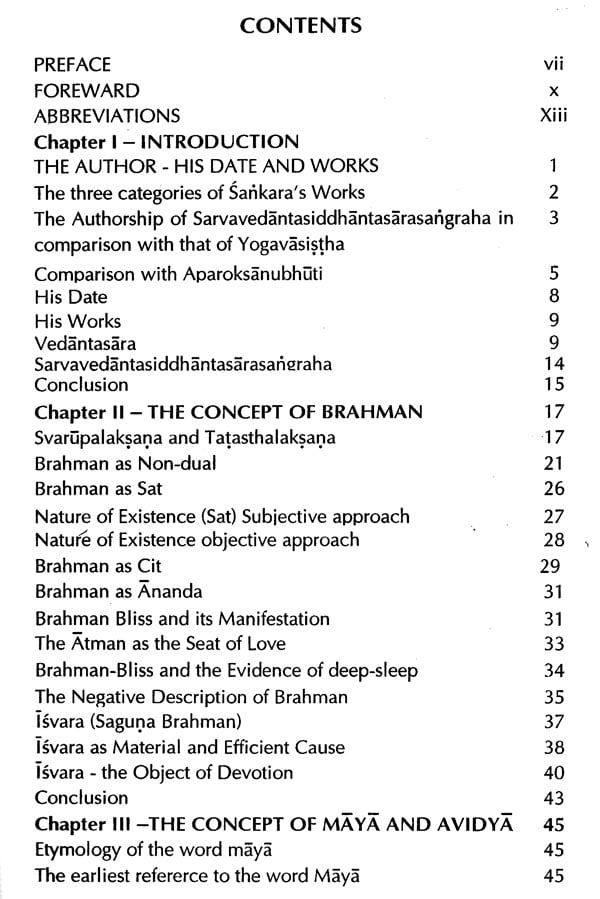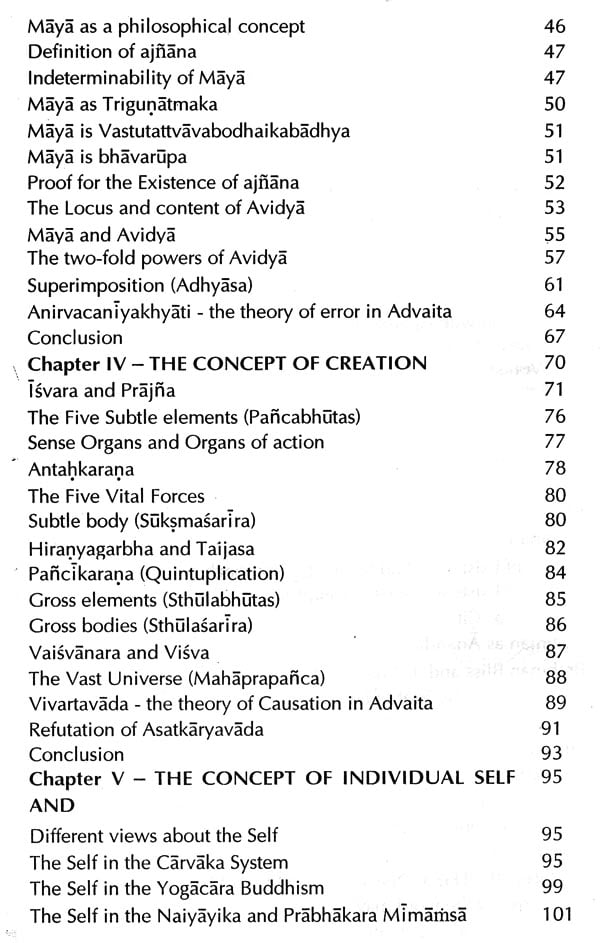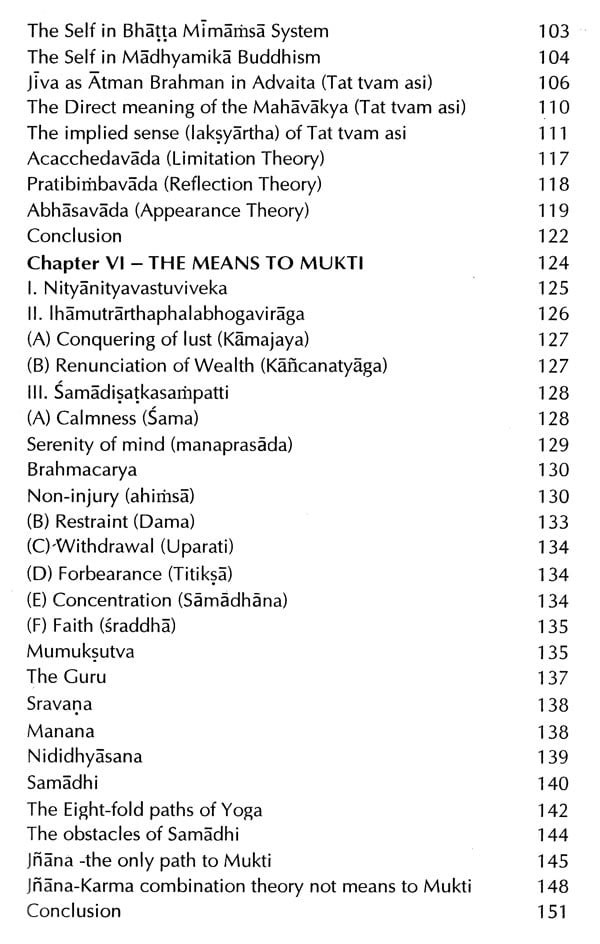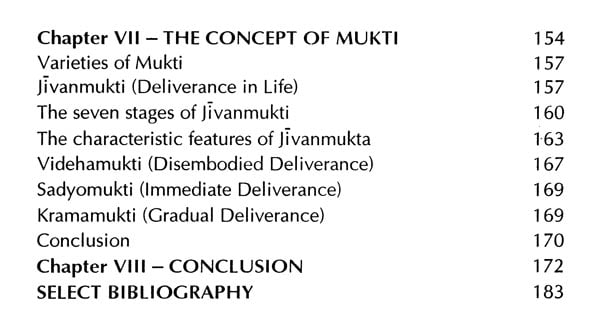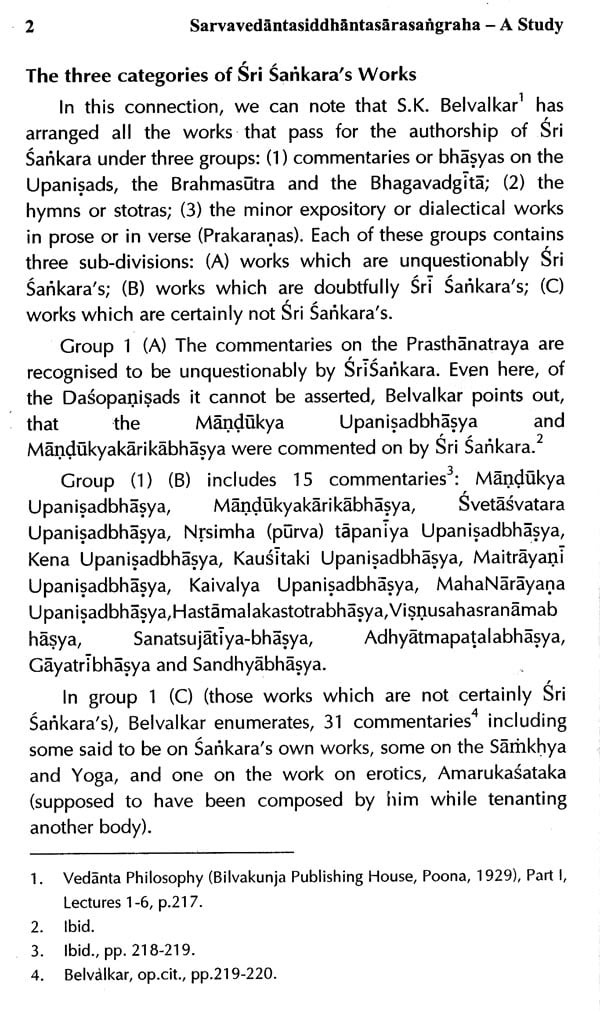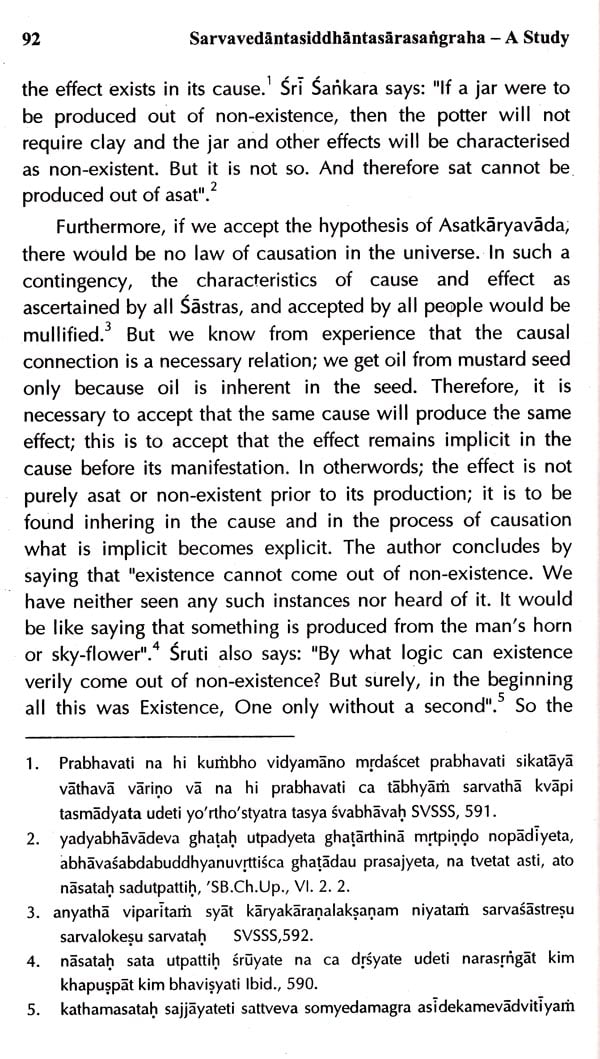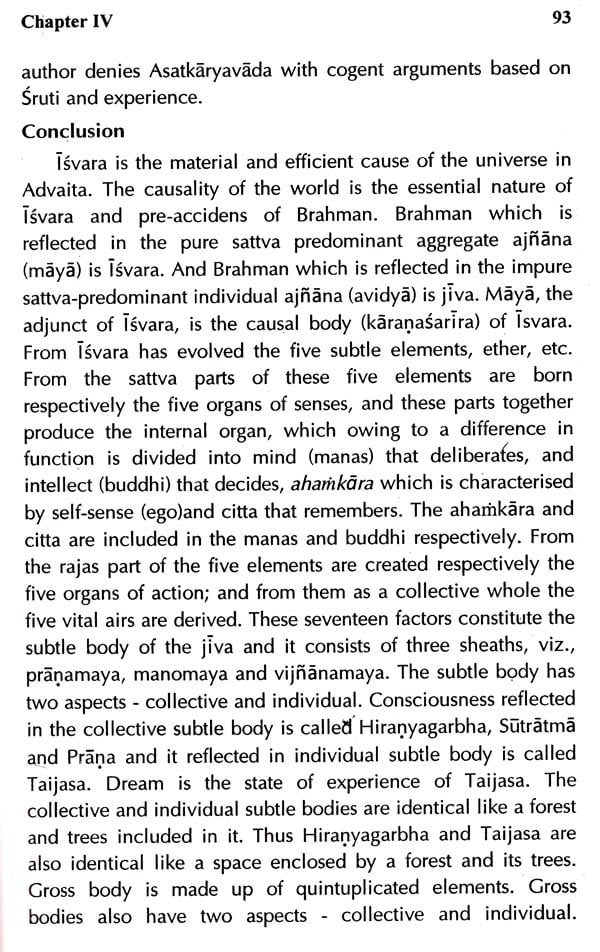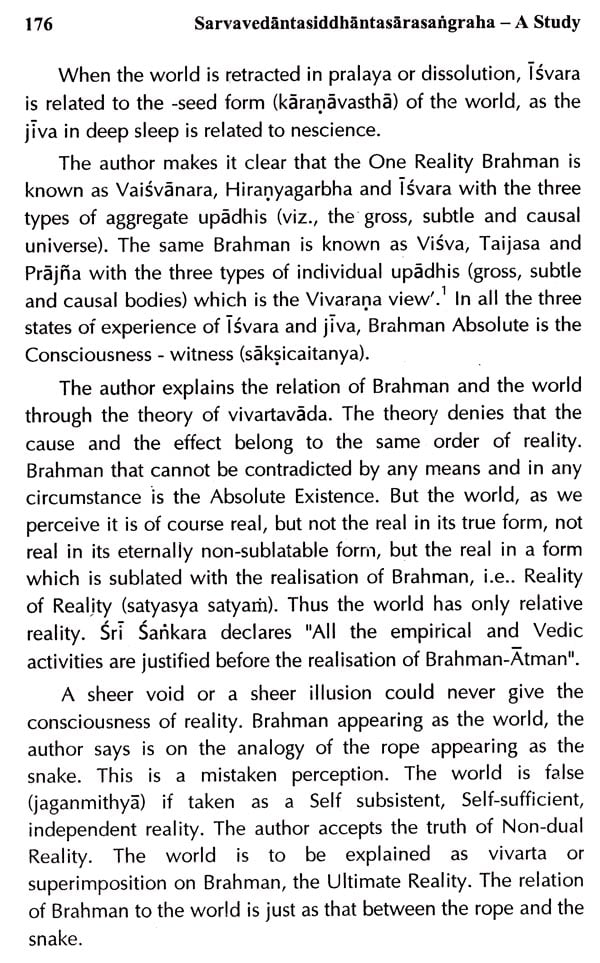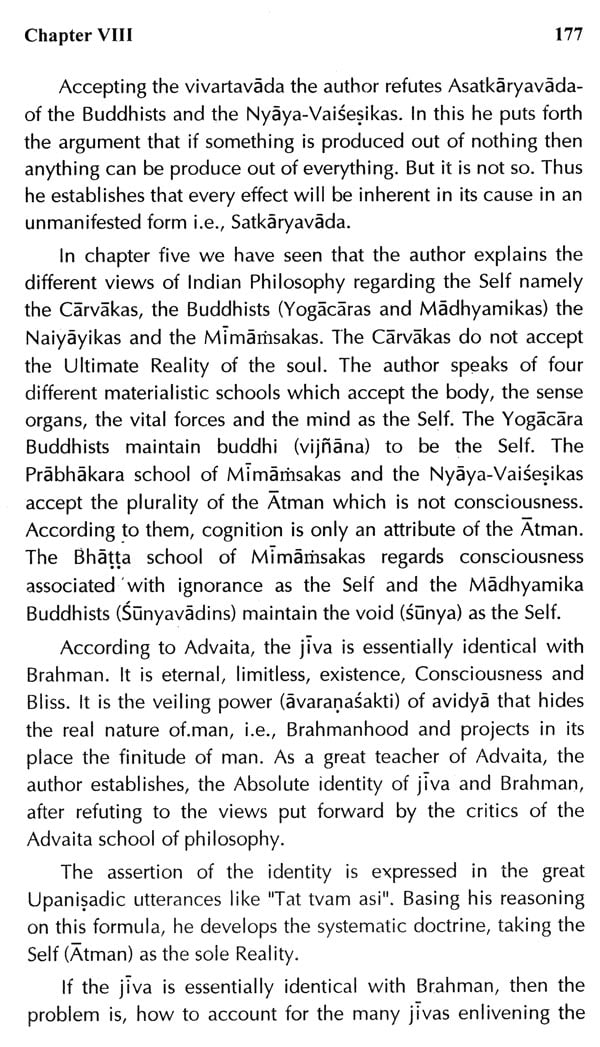
Sarva Vedanta Siddhanta Sara Sangraha (A Study)
Book Specification
| Item Code: | NAR338 |
| Author: | Dr. S. Geethamony Amma |
| Publisher: | Parimal Publication Pvt. Ltd. |
| Language: | English |
| Edition: | 2013 |
| ISBN: | 9788171104413 |
| Pages: | 2018 |
| Cover: | HARDCOVER |
| Other Details | 9.00 X 6.00 inch |
| Weight | 400 gm |
Book Description
Sarvavedantasiddhantasarasangraha is an important manual of the philosophy of Advaita. Though sometimes ascribed to Sri Sankara, it seems to be a work of much later origin. It is an expository treatise - Upadegagastra solely intended to instruct the pilgrim on the spiritual path. It consists of 1008 verses mostly in anustup form of verse rhythm, but here and there we find longer meters also. As the title of the text indicates, it consists of all the important doctrines of Advaita. In this book an attempt is made to delineate the subject matter properly and to analyze the content critically.
Sarvavedantasiddhantasarasangraha is an important manual of the philosophy of Advaita. Though sometimes ascribed to Sri Sarikara, it seems to be a work of much later origin. It is an expository treatise - Upadegagastra solely intended to instruct the pilgrim on the spiritual path. It consists of 1008 verses mostly in anustup form of verse rhythm. But here and there we find longer meters also. As the title of the text indicates, it consists of all the important doctrines of Advaita. In this book an attempt is made to delineate the subject matter properly and to analyze the content critically.
The book, Sarvavedantasiddhantasarasarigraha - A Study, consists of an introduction and seven other chapters. In the Introduction entitled "The Author His Date and Works", it is pointed out that now more than 400 works are known under the authorship of Sri Sankara. But most of these are definitely later works composed by some of his disciples and followers. So the real authorship of Sarvavedantasiddhantasarasarigraha has to be ascertained. This is done in this chapter.
In chapter II, the concept of Brahman, the Non-dualistic formulation in Advaita - the oneness of Reality is taken up for discussion.
In chapter III, The Concept of Maya and Avidya is dealt with. Advaita has made clear how from the One Non-dual Reality the world of plurality comes into existence. The principle which is given as responsible for manifestation of duality is Maya.
In chapter IV, The Concept of Creation is taken up for discussion. The concepts of the causal, subtle and gross bodies, i§vara and Prajfia, Hirarnagarbha and Taijasa, Vaivanara and Viva as explained in the text are dealt with. Vivartavada and the refutation of Asatkaryavada are also explained in detail.
The Concept of Individual Self (Jiva) and Transcendental Self forms the content of chapter V. The concept of the self in the different systems of thought such as the Carvakas, the Buddhists (Yogaca-ra and Madhyamika), Naiyayika and Mimariasaka is discussed. The view of Advaita i.e., the Absolute identity of Jiva (as Atman) and Brahman is explained.
The Means to Mukti is dealt with in chapter VI. Various gradual steps are suggested by the author for the traveler along the difficult path leading to the Summum-Bonum. The four-fold prerequisites in the aspirant; the three-fold means of hearing (ravarta) reflection (manana) and meditation (niddhyasana); the two kinds of samadhi (savikalpaka and nirvikalpaka); the eight-fold (astanga) yoga; and Jliana as the only means to Mukti, are critically examined in this chapter.
Chapter VII is entitled "The Concept of Mukti". It is pointed out that Mukti is not a new state to be attained but is the very nature of the Self. The characteristics of Jivanmukti and Videha-mukti are explained in detail. The concept of Jivanmukti is a unique one in Advaita Vedanta. The author brings out clearly the seven stages of Jivanmukti. The characteristic features of the Jivanmukta and the Videhamukta are brought out. In this context the concepts of Sadyomukti and Kramamukti are mentioned.
The concluding chapter, Chapter VIII, sums up the findings of the proceeding chapters. Sarvavedantasiddantasarasangraha may be said to occupy a distinctive position among the works of Advaita because it explains clearly and in detail the deep philosophical truths of the system. The pragmatic test of a treatise on Advaita is its usefulness as a guide for the seeker after Truth. And this book Sarvavedantasiddhantasarasangraha -A Study is an attempt to bring out the various aspects of Advaitic thought as explained in the text.
In undertaking this study I had the guidance and help of a number of scholars. My great indebtedness is to my Supervising Teacher, Dr. R. Karunakaran, Former Honorary Professor and Director, Centre for Vedanta Studies, University of Kerala. I wish to express my sincere feelings of gratitude to Dr. A.S. Narayana Pillai, formerly Professor of Philosophy, University College, Thiruvananthapuram, and Dean, Faculty of Philosophy University of Kozhikkode, who has encouraged me from time to time by giving valuable suggestions. I wish to record my thankfulness to Dr. N.P. Unni, Former Professor and Head, Department of Sanskrit, University of Kerala for the encouragement I have received from him.
I have to place on record my sense of gratitude to the University Grants Commission for awarding me a Research Fellowship which has helped me in carrying out this Research project.
